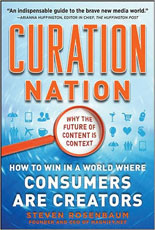At one time, the word curator referred to a highly trained person who made a selection of objects of art for a gallery or museum. But now the word has been transformed and popularized to include anyone gathering and organizing data or information in a way that is enlightening, entertaining, and appealing. While computers can aggregate large amounts of content, it takes the experience, knowledge, and creativity of a human being to select, organize, and present the information in the best possible way.
Steven Rosenbaum is an entrepreneur, filmmaker, and digital curator who believes that "curation is an exhilarating, fast-moving, evolving idea that addresses two parallel trends: the explosive growth in data, and our need to be able to find information in coherent, reasonably contextual groupings. No one doubts that we're shifting from an era of content scarcity to one of content abundance." The author has interviewed more than 70 people and put together a fascinating overview of this digital phenomenon.
Rosenbaum begins his history of curation with pieces on Reader's Digest Time magazine, and cable TV as purveyors of content for the American public. He moves on to "Big Time Curators on the Rise" where he comments on Huffington Post, MSNBC, and Newser. What have they accomplished? According to the author, they have revealed curation as key to the future of journalism. He also sees it as the future of conversations with consumers.
Rosenbaum salutes the democratization of curation where Facebook users see themselves as community curators offering links, images, media, and music to their friends. He then provides a guide to turning curation into a business. This ambitious work also covers material on networks and micronets, Twitter, tools of the trade such as RSS feeds and YouTube, and the hot issue of privacy.
Throughout Curation Nation Rosenbaum presents insightful commentary from movers and shakers in the fields of business, media, and the Web. After reading this book, you will agree with his assessment: "Curation is the 'new magic' of the connected world — fixing the signal-to-noise problem and making the world contextual and coherent again."
